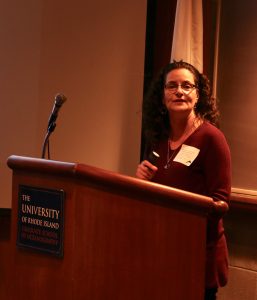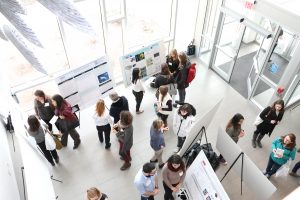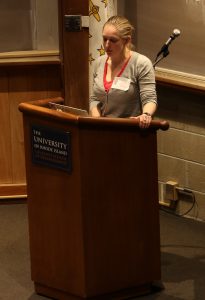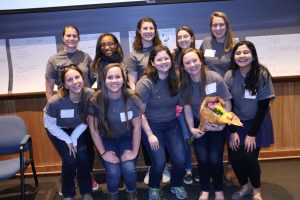Navigating a sea of choices: SWMS Symposium
Written by: Christina Hernandez
On Saturday, March 24, 2018, the campus of the University of Rhode Island Graduate School of Oceanography (URI GSO) was host to approximately 150 scientists for a symposium of the Society for Women in Marine Science (SWMS). The symposium was titled “Navigating a sea of choices in marine science” and focused on mentorship and career development. This was the first SWMS symposium put on by one of its chapters, instead of by the central steering committee. The URI Chapter is good at firsts, since they were also the first SWMS chapter! For me, this was the first SWMS symposium that I participated as an attendee instead of an organizer, and I am so impressed with what the URI-SWMS team accomplished!
The day began with two keynote speakers. First, URI professor Dr. Bethany Jenkins told us about her journey into marine science. Bethany opened her presentation with a picture of the Flying Cloud clipper ship, and the story of Elenor Creesy, the ship’s navigator. In 1851, this woman, born in Marblehead, MA set the record for the fastest trip from New York City to San Francisco, traversing Cape Horn. Women like her inspired Bethany. Another groundbreaking woman who inspired Bethany in her youth was Barbara McClintock, who in 1983 won a Nobel Prize for her pioneering work on mobile genetic elements in corn. Throughout Bethany’s talk story, two themes emerged (1) how the support from men in science, such as a male postdoc advisor directly advocating for Bethany to be involved in a project in the genome of a diatom species, and (2) her focus on her next decision rather than a 10-year plan, gave her the flexibility to change fields after her PhD in chemistry and move into marine science.

The amazing Catalina Martinez was the second keynote speaker. She dropped truth bombs all day! Photo by Emma Ferrante (URI).
The second keynote speaker was Catalina Martinez, a Regional Program Manager for NOAA’s Office of Ocean Exploration and Research. Catalina is a dynamic speaker, and she is very open about her journey to NOAA. She grew up in a very traditional Cuban community in Providence, RI, a community that did not see education for girls as a priority. Despite this, Catalina pursued her education doggedly; she chipped away at course requirements for years before enrolling as a full-time student at URI with junior class standing at 28 years old. Catalina’s messages was one of empowerment: she said “Never underestimate the value of your unique perspective and experience,” and she stressed the value of all kinds of diversity in creating stronger, more creative project teams. She also pushed us to think about the ‘affinity bias’ that we experience in growing the circle of people we trust, and challenged us to “walk towards your discomfort, which takes deliberate action.” One is inclined to say that Catalina isn’t afraid of anything, but maybe it would be more accurate to say that Catalina doesn’t let her fears stop her from being her own best advocate and guide.
After the keynote talks, we broke off into small group discussions about mentorship and career choices, with about 10 people per group. For this session, people were randomly placed into groups, and all groups were given the same prompt questions. We shared stories from our diverse career paths, opened up about hard moments or stumbling blocks or scary choices, and talked about how you can’t expect one mentor to fulfill all your needs. These small group discussions, which SWMS used for the first time at the fall symposium, are becoming a really valuable way for us to connect and build community amongst marine scientists with lots of identities.
During lunch, there were posters and exhibits, tours of the Inner Space Center, and oral history collections for the research project that SWMS is developing. I went to see a few posters, but I spent a big chunk of the lunch hour connecting with a few fellow attendees, including a married couple that has been coming to our meetings for a couple years now, and I was so excited to see. I spent some time in the poster hall, listening to a poster presentation about the evolution of vagina morphology in cetaceans (seriously, so cool!), and it made me very happy to hear the high-energy buzz of voices.

View from the second level in the poster session. Photo by Emma Ferrante (URI).
After lunch, we went into a skills-based session. The ones on offer were a science communication workshop, a Work-Life Balance Panel, a Career Panel, a Grad School Panel (Application à Graduation), and a workshop on how to get your publication noticed. I went to the publication workshop, led by Dr. Jackie Webb. We talked about how the methods of literature searching have changed dramatically in the past decade, and the importance of choosing the right keywords and title based on possible search terms. We practiced writing two titles: one based on a description of our project, and one based on the findings of our project. Jackie taught us that if you write a title saying what you did, it will not get as much attention as if you titled it with the impacts of the results.
Next, we went into a second round of small group discussions, but in this case they were based around specific topics: Work Life Balance, Confidence and Image, Lab/Field Experiences, Mentorship, How Can Men Best Support Women, Inclusion and Intersectionality, and Career Chat.
I went into the Inclusion and Intersectionality discussion, which was facilitated by Catalina Martinez. I have been searching for this conversation, searching for a way to face these issues here in New England, that a lot of the work we are doing as SWMS feels like it is missing some critical layers of diversity. Our conversation was very broad, and people in the room wore so many different identities. Many people came into the discussion because they are part of an underrepresented or invisible group, but others were there to learn how to support students or colleagues from intersectional groups. There were graduate students, non-profit staffers, university administrators, new faculty, senior faculty, and everyone in between. We shared tips for how to deal with the moments when you are asked to be the representative of your group and teach everyone else about your experience. We talked about why things aren’t changing despite years of ‘lip service’ about diversity in science.
During this discussion, I learned a concept which has become very important to me in the weeks since: “barriers to entry.” The way that a graduate application process is written or structured can be in itself a barrier to entry, but so can the rubrics used to assess applicants. The life journey of diverse students has to be valued in addition to the raw scores, or else progress on inclusion will keep crawling at a snail’s pace. I am involved with a few other students who want to push the administration of the MIT/WHOI Joint Program to analyze the reasons that our program continues to have low diversity.

Chrissy Hernandez reports out on themes and takeaway messages from the Inclusion and Intersectionality small group discussion. Photo by Emma Ferrante (URI).
We also had a lengthy discussion of ‘invisible identities,’ including chronic illness and some disabilities. Although a community of support comprised of others facing similar issues would be helpful, it is hard to find those people because of the reluctance to reveal these invisible identities. Not everyone agreed on whether their disability defines them, and one woman shared that she didn’t learn about her disability until later in life, and knowing that she could get accommodations motivated her to go back to school and follow a dream. It’s okay that talking about disability or illness is uncomfortable, but having those conversations about breaking down stigmas is so important, because something as simple as listening to your papers instead of reading them can improve your quality of life and your productivity so much. Two themes arose: it is critically important to learn to be your own advocate, and building relationships is the foundation to shifting attitudes.
Finally, we all returned to the auditorium to do our final report-outs from our group discussions. The Confidence and Image group taught us about the importance of having an “I’m so bitchin’” folder, which contains snippets and printouts of all the things that make you feel awesome about yourself. The Lab/Field Experiences group highlighted that when you are seeking help, you want to talk to people who have impartial perspectives, are empathetic, who you respect, and who have enough power to make changes. The Mentorship group reminded us that there is no benefit to burnout, and that it is really valuable when mentors share their failures with their mentees. The group on Men Supporting Women admitted that bias happens and is pervasive, but that men must take a proactive approach rather than waiting to be told that something is happening, and that bias education should be a formal component of annual reviews and formal trainings. And finally, the Career Chat reported that their small group was comprised of people facing a transition and that they discussed some options for going into industry.

The leadership team that put together and executed the URI-SWMS Spring Symposium! Photo by Emma Ferrante (URI).
I am so impressed with the fantastic group of women who put this symposium together. They were busy and running around all day, coordinating events taking place across 4 buildings on the GSO campus. They spread the word far and wide, and there was more diversity at this event than I’ve seen at any of our previous symposiums at WHOI. There were people from all career stages from undergraduate students to senior faculty. There were more shades of skin color, more men, and more people outside of a strict definition of ‘marine science’ than I have seen at any previous SWMS meeting.
Two members of the URI-SWMS leadership, Alexa Sterling and Anna Robuck, also sit on the SWMS Steering Committee, and I can’t wait to discuss how to keep improving our symposium model and bringing diverse groups of people together to advance diversity in marine science. If you’d like to learn more about SWMS, please visit our website, become a member, follow our Facebook page, and read or contribute to our blog. You can bring SWMS to your institution by starting a chapter.